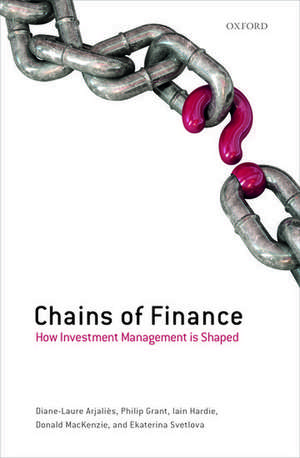Chains of Finance: How Investment Management is Shaped
Autor Diane-Laure Arjaliès, Philip Grant, Iain Hardie, Donald MacKenzie, Ekaterina Svetlovaen Limba Engleză Hardback – 29 iun 2017
Preț: 334.69 lei
Nou
Puncte Express: 502
Preț estimativ în valută:
64.04€ • 67.05$ • 52.99£
64.04€ • 67.05$ • 52.99£
Carte tipărită la comandă
Livrare economică 25-31 martie
Preluare comenzi: 021 569.72.76
Specificații
ISBN-13: 9780198802945
ISBN-10: 0198802943
Pagini: 206
Dimensiuni: 160 x 240 x 19 mm
Greutate: 0.48 kg
Editura: OUP OXFORD
Colecția OUP Oxford
Locul publicării:Oxford, United Kingdom
ISBN-10: 0198802943
Pagini: 206
Dimensiuni: 160 x 240 x 19 mm
Greutate: 0.48 kg
Editura: OUP OXFORD
Colecția OUP Oxford
Locul publicării:Oxford, United Kingdom
Notă biografică
Diane-Laure Arjaliès is an Assistant Professor at the Ivey Business School, Western University (Canada). Before joining Ivey, Diane-Laure was an Assistant Professor at the Accounting and Management Control Department of HEC Paris. She received her PhD in business administration from ESSEC Business School in Paris and holds an MBA and a M.Sc. in organizational theory. She also has several years of experience in responsible investments at an asset management company. Utilizing qualitative methods, Diane-Laure investigates the introduction of non-financial performance measures in the investment industry. Her work in this area has won her several academic and professional prize.Philip Grant is a social anthropologist and sociologist who worked for five years as an equity fund manager in London prior to commencing his academic career. Recent research has focused on the investment management industry, but also on wider questions of economic anthropology and sociology, with a view to expanding the insights offered by the social studies of finance to other areas of social life. His doctoral research was a collaborative ethnographic project working with Iranian women's activists in the diaspora, and he is drawing on this material for a future comparative study of civil society in Iran and Tunisia.Iain Hardie is a Senior Lecturer in International Relations at the University of Edinburgh. After an 18 year career in investment banking in London and Hong Kong, he completed a PhD in Edinburgh in 2007. He is the author of Financialization and Government Borrowing Capacity in Emerging Markets (2012) and co-editor of Market-Based Banking and the International Financial Crisis (2013) and of articles in journals including World Politics, Review of International Political Economy, New Political Economy, Socio Economic Review and Journal of Common Market Studies.Donald MacKenzie is a Professor of Sociology at the University of Edinburgh. He is primarily a sociologist and historian of science and technology. His current research is on the sociology of financial markets, and he is researching in particular the development of automated high-frequency trading and of the electronic markets that make it possible, with a special focus on how trading algorithms predict the future.Ekaterina Svetlova is Associate Professor in Accounting and Finance at the University of Leicester, School of Business. Previously, she was a researcher and a lecturer at the University of Constance, Germany, Zeppelin University, Friedrichshafen, Germany, and University of Basel, Switzerland. She also used to work as a portfolio manager and financial analyst at a big investment company in Frankfurt/Main, Germany, for six years. Ekaterina has published on themes such as economic sociology, social studies of finance and economic philosophy.












